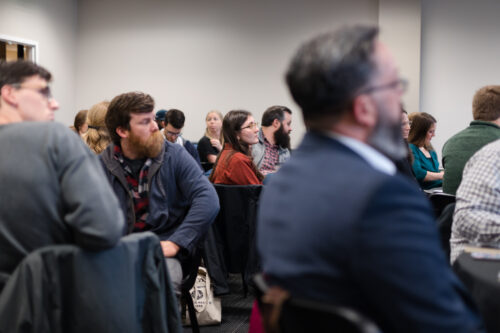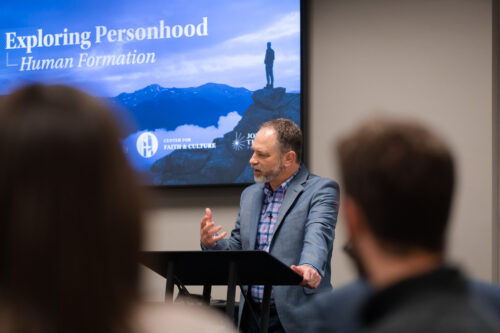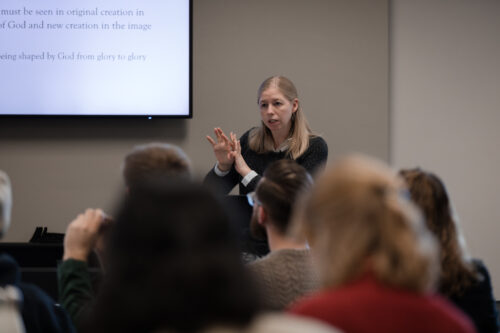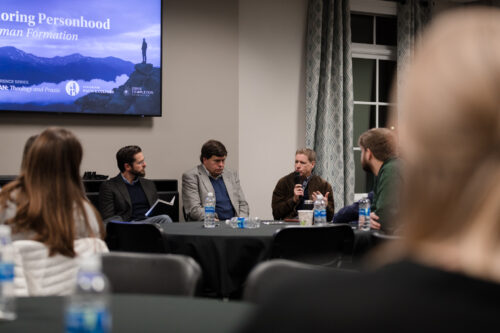Discipling Holistic Beings: SEBTS Hosts Conference on Human Formation
Chad Burchett | February 06, 2023

Theology and other disciplines — such as the sciences or philosophy — are not dread enemies. Together they enable the Church to minister effectively to the whole person.
 Despite the tension and perceived conflict between theology and philosophy or theology and the sciences, Southeastern Baptist Theological Seminary wants to help Christians develop a biblical perspective on engaging various disciplines about the topic of human personhood.
Despite the tension and perceived conflict between theology and philosophy or theology and the sciences, Southeastern Baptist Theological Seminary wants to help Christians develop a biblical perspective on engaging various disciplines about the topic of human personhood.
On February 2-3, Southeastern’s L. Russ Bush Center for Faith and Culture (CFC) hosted its second annual conference in its ‘Being Human: Theology and Praxis’ series. This year’s conference, ‘Exploring Personhood: Human Formation,’ invited Christian theologians, scientists, philosophers, psychologists, counselors, and pastors to weigh in on what their fields can contribute to the conversation on human formation.
“Ministry at its core is about seeing people formed into Christlikeness,” commented Nathaniel WIlliams, North Carolina pastor and CFC editor and content manager. “Pastors and church leaders need all the tools in their toolbox to be able to fulfill this task well. ‘Exploring Personhood: Human Formation’ was designed with this need in mind. By bringing together experts from various fields, we hope to foster ongoing dialogue that will help us love God and serve people better.”
Ministry at its core is about seeing people formed into Christlikeness.
Committed to the sovereignty and authority of God in all areas of life, Southeastern believes the Church can often be enriched and equipped by dialogue with scientists, philosophers, and counselors. In a world created and sustained by God’s power and provision, God’s people need not fear or avoid dialogue with other disciplines and may benefit from their insights when received with humility and biblical discernment.
 “The CFC is leading the way in encouraging healthy dialogue between the Church and other disciplines so that the people of God can be thoroughly equipped for ministry,” commented Southeastern President Danny Akin. “We hope to model how Christians can think biblically about matters of science, philosophy, theology, and counseling and use discernment when availing themselves of insights from various disciplines.”
“The CFC is leading the way in encouraging healthy dialogue between the Church and other disciplines so that the people of God can be thoroughly equipped for ministry,” commented Southeastern President Danny Akin. “We hope to model how Christians can think biblically about matters of science, philosophy, theology, and counseling and use discernment when availing themselves of insights from various disciplines.”
As conference speakers reminded attendees, philosophy and the sciences are not only tools for enrichment but also domains that are brimming with opportunity for vibrant Great Commission ministry. That is why this year’s conference cast a vision for how the Church can biblically engage the sciences, disciple scientists in their local churches, and reach a culture indelibly shaped by science and technology.
“Scientists are in our churches,” shared Drew Rick-Miller, project codirector of Science for the Church. “How are we caring for them? How do we help them understand their work as a Christian vocation? Also, how do we engage a community saturated with science and technology?”
How do we engage a community saturated with science and technology?
 This discipleship framework is integral to faithful engagement with other disciplines on the topic of human formation. As conference speakers and panelists noted, every human is being formed toward something, and the end of that formation profoundly matters.
This discipleship framework is integral to faithful engagement with other disciplines on the topic of human formation. As conference speakers and panelists noted, every human is being formed toward something, and the end of that formation profoundly matters.
“We have to see humans as holistic beings, and their formation has to be holistic as well,” shared Kristin Kellen, Associate Professor of Biblical Counseling and Associate Director of EdD Studies at Southeastern. “Our entire being is being conformed into the image of Christ. … We direct others toward a particular end: conformity to the image of Christ in love for his glory and for delight in him.”
We have to see humans as holistic beings, and their formation has to be holistic as well.
As a Great Commission seminary, Southeastern is committed to equipping Church and ministry leaders to engage culture and the contributions of other disciplines from a framework of discipleship. That is why the CFC exists and how this year’s conference challenged attendees to ground their perspective on human formation.
Representing Christian perspectives from a variety of disciplines, plenary conference speakers included:
- Christian Miller, A. C. Reid Professor of Philosophy at Wake Forest University and director of the Honesty Project
- Jennifer Herdt, Gilbert Stark Professor of Christian Ethics at Yale University Divinity School
- Kelly Kapic, professor of theological studies at Covenant College
- Andy Davis, senior pastor of the First Baptist Church of Durham, NC, and the founder of Two Journeys Ministry
- Dru Johnson, associate professor of biblical and theological studies at The King’s College in New York, NY, and director of the Center for Hebraic Thought
- Todd Hall, professor of psychology at Biola University’s Rosemead School of Psychology
- Kristin Kellen, Associate Professor of Biblical Counseling and Associate Director of EdD Studies at Southeastern
 The Being Human: Theology and Praxis conference series is made possible by a $1.53 million grant that Southeastern received in 2021 from the John Templeton Foundation. This grant continues to enable the CFC to host events and produce resources for the Church on topics related to theological anthropology. By addressing this pressing topic, the CFC hopes to engage culture as salt and light, presenting the Christian faith and demonstrating its implications for all areas of human existence.
The Being Human: Theology and Praxis conference series is made possible by a $1.53 million grant that Southeastern received in 2021 from the John Templeton Foundation. This grant continues to enable the CFC to host events and produce resources for the Church on topics related to theological anthropology. By addressing this pressing topic, the CFC hopes to engage culture as salt and light, presenting the Christian faith and demonstrating its implications for all areas of human existence.
To learn more about CFC resources or upcoming events, visit the center’s website, or check out the center’s mentorship program to discover how the CFC can equip you for biblical ministry in an ever-changing culture.